-

The following photos, supplied by Occupy Sandy New Jersey, chronicle the post-storm cleanup spearheaded by Occupy Sandy N.J. and myriad volunteers. All were taken between November and March 15, 2013.
Beach Haven West, New Jersey
-
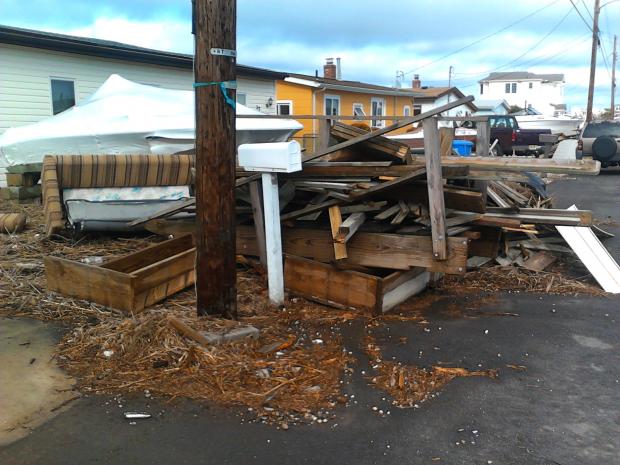
Beach Haven West, New Jersey
-
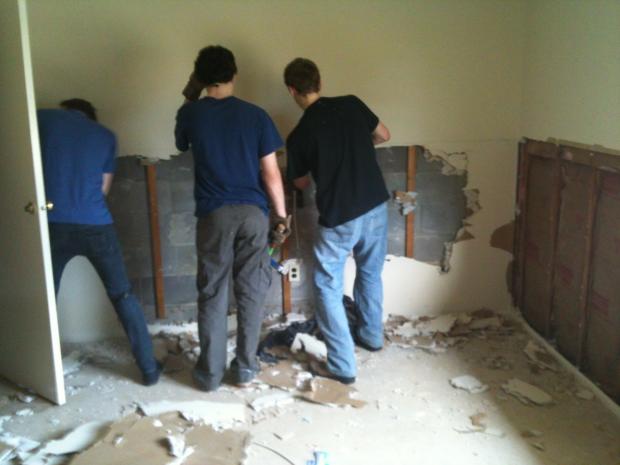
Teenagers work on a storm-damaged house in Monmouth, New Jersey
-
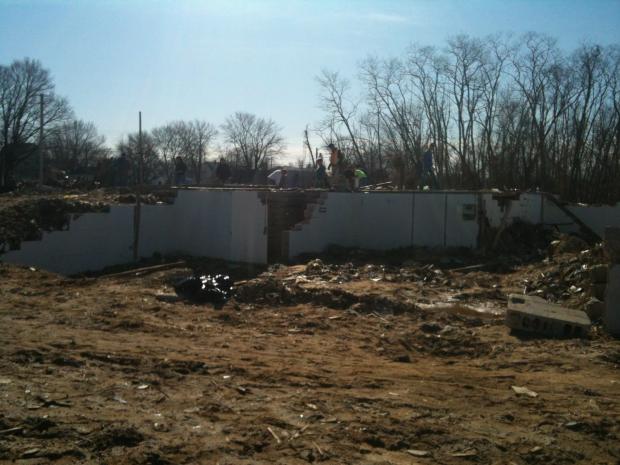
Union Beach, New Jersey
-

Dawn DeLuca
-

Dawn DeLuca
-
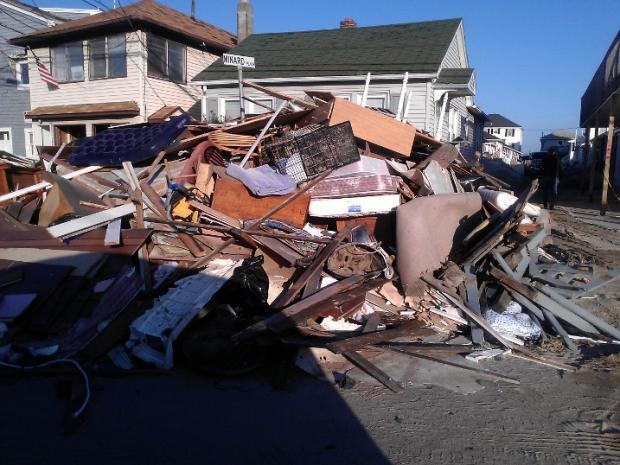
Dawn DeLuca
-
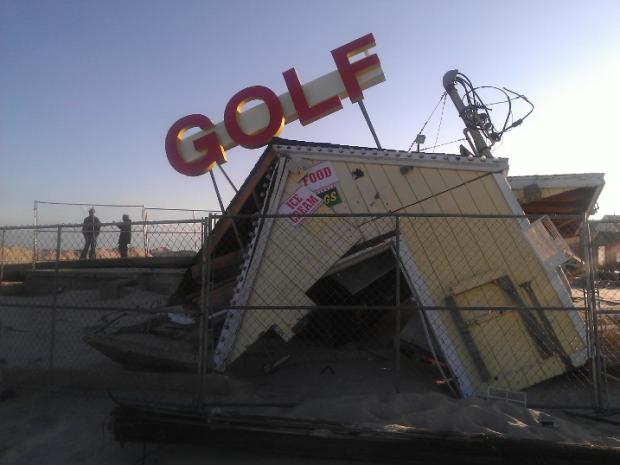
Dawn DeLuca
-
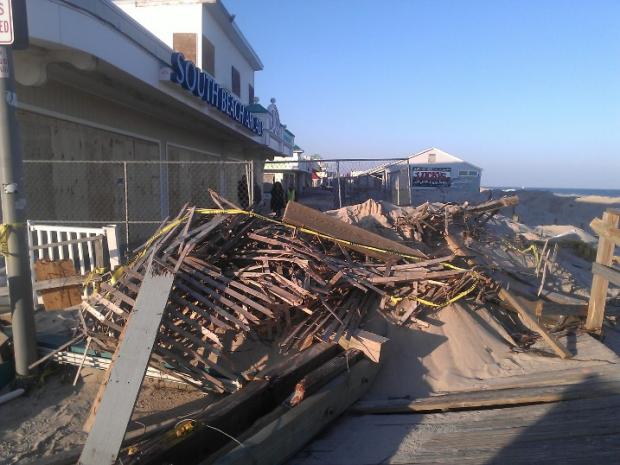
Dawn DeLuca
-
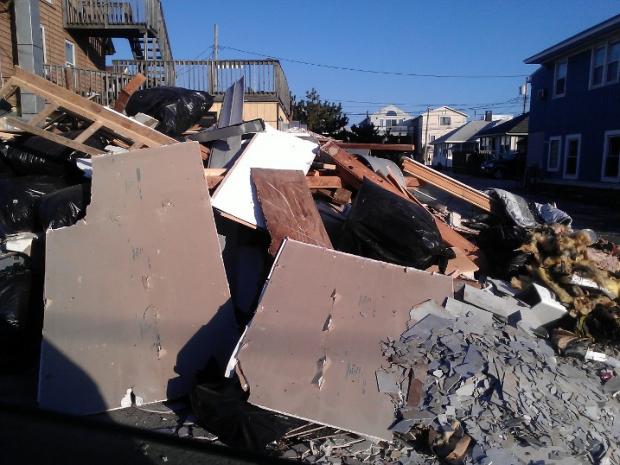
Dawn DeLuca
-

Cynthia Laughlin. Caption: Pittsburgh LaRoche College held an Alternate Spring Break three weeks ago in Union Beach, N.J., consisting of storm cleanup. On their first day they worked on a decimated home on Brook Avenue, which runs along Raritan Bay.
-

Cynthia Laughlin. Caption: Pittsburgh LaRoche College held an Alternate Spring Break three weeks ago in Union Beach, N.J., consisting of storm cleanup. On their first day they worked on a decimated home on Brook Avenue, which runs along Raritan Bay.
-
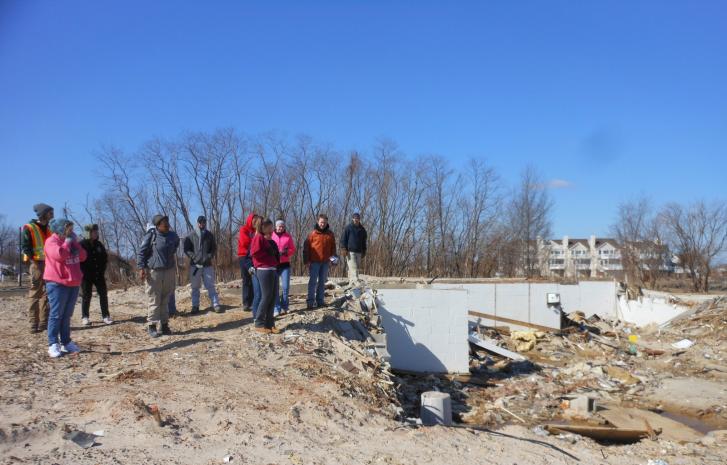
Cynthia Laughlin. Caption: Pittsburgh LaRoche College held an Alternate Spring Break three weeks ago in Union Beach, N.J., consisting of storm cleanup. On their first day they worked on a decimated home on Brook Avenue, which runs along Raritan Bay.
-
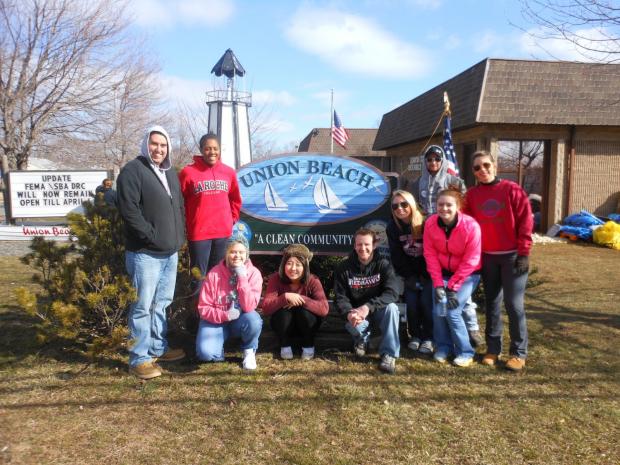
Cynthia Laughlin. Caption: Pittsburgh LaRoche College held an Alternate Spring Break three weeks ago in Union Beach, N.J., consisting of storm cleanup. On their first day they worked on a decimated home on Brook Avenue, which runs along Raritan Bay.
Today marked the end of the seven-day public comment period on how New Jersey plans to spend $1.8 billion in federal funds for Hurricane Sandy relief. The following public statement outlines Occupy Sandy New Jersey's response to the State of New Jersey's Community Development Block Grant Disaster Recovery Action Plan, and urges the state to pursue a more democratic, sustainable and locally-based effort moving forward:
We are writing to express our serious concerns in response to the proposed Community Development Block Grant Disaster Recovery “Action Plan” compiled by the New Jersey Department of Community Affairs for the disbursement of $1.8 billion in federal funds.
The action plan makes mention of some admirable intentions, but it also reveals and highlights the State's lack of real action in many critical arenas. We recognize that this particular action plan is limited to only the initial dose of federal funding and is thus focused on federally mandated requirements, but we nevertheless are troubled by certain items and the general lack of specifics in this plan, the most thorough explanation of New Jersey's long-term recovery goals yet to be released to the public.
First and foremost, the plan makes plain the utter failure of the State to include adequate input from the people of New Jersey. Leaving aside the federally-mandated 7-day public comment period (and the lack of public meetings around this plan during the comment period), simply by detailing the level of “citizen participation” to date (section 6.9.1), the plan makes clear that the voices of New Jersey residents themselves have been largely absent from the discussion, although those of the private sector, various lobbyist associations, universities, and other elite voices have been heard. As a case in point, the only way for residents to have their voice heard on this plan is to send comments to an e-mail address, excluding those without ready access to the Internet.
Where are the State-sponsored public assemblies, town hall meetings, or educational workshops? Where is the outreach? How can the State claim to have been “in constant communication with its residents” when our organizers encounter storm survivors every day who say they have been left out in the cold, without so much as a knock on the door?
Beyond the lack of input from storm survivors themselves, the plan also fails to create any avenues for local decision-making about long-term recovery priorities or practices. The proposal outlines a top-down approach that is sure to continue ignoring the voices of countless New Jerseyans (including immigrant residents, both legal and undocumented, who are absent from the "Citizen Participation Plan" from word one). We believe that the State should be encouraging local municipalities to create their own detailed "Action Plans," and facilitating the process, so that the hardest hit communities themselves can drive their own recovery, not Trenton bureaucrats and private developers.
We are also troubled by the lack of any clear plan to rebuild sustainably or to use any federal funds to focus on the most important mitigation effort above all: putting an end to global climate change. Section 6.3 notes that the State “has had several meetings” with various organizations “to develop a plan for encouraging sustainable community initiatives and implementing green building, energy efficiency and storm hazard mitigation measures,” but there is no timetable laid out for the development of said plan, nor any clear path forward.
Also, mentions of “sustainability” in the plan are limited to housing construction, which ignores the need for rebuilding a public infrastructure—including a decentralized alternative energy system—more sustainable than that which was destroyed, or for prioritizing more sustainable development over less sustainable projects (since funds are generally to be doled out on a “first-come, first-served basis, the first applicants will be prioritized, not those with the best, most sustainable development plans).
Millions of dollars are already earmarked for public relations campaigns urging visitors to come to New Jersey and encouraging residents to “Buy Local,” both of which are indeed important to the economic future of the State, especially in the short term, but why will there be no public relations campaign detailing the links between human behavior—in New Jersey and elsewhere—and the increased intensity of storms caused by climate change? The plan itself is supposed to "account for and address sea level rise" (section 6.2.1), but how can this be done without addressing the root causes of sea level rise?
Furthermore, as a group of activists committed to social justice, we are especially worried about how people with low incomes, homeless people, people with disabilities, people of color, and immigrants will fare once this plan is put into effect. We are concerned that the "Blight Reduction Pilot Program" (section 4.2.3.2) could be selectively used to help developers push low-income individuals and families out of certain neighborhoods.
We are also particularly concerned about the lack of due consideration in the plan for people who rent their homes, who are not to be provided with compensation for lost property (even as business owners are to be compensated for lost income [section 2.4.5]) and for whom there will be far less housing assistance provided (in comparison to homeowners). Renters begin the process with many disadvantages, so their needs should be given priority, not minimized, by any governmental recovery plan. The same "first-come, first-served" basis mentioned above is very likely to result in the further marginalization of people who come to the process with disadvantages, since people who are well-connected (both literally and figuratively) will be in a much better position to know about these programs and to know how to apply.
The plan rightly acknowledges that the bulk of the data used in the State's assessments is incomplete, yet no concerted effort is to be made by the state to solve this problem. There will be no door-to-door canvassing, nor even a statewide program to encourage municipalities to gather and pool their own data. Since so much of the data used by both the federal and state governments has been gleaned by loan applications to the Small Business Administration, and tens of thousands of storm survivors never applied to for the SBA loan, nor ever will, this main source of data is fundamentally flawed. When it comes to the unmet needs of individuals and families—from much-needed home repairs to trauma counseling—the State's analysis is woefully incomplete and inaccurate. New Jersey must do a far better job of determining the true extent of the damage caused by Sandy if it is ever to begin to repair it.
Finally, from working in the communities hardest hit by the storm, we have come to realize just how hazardous this storm has been to so many residents in terms of both physical and mental health, and yet the section (2.5.4) on public health and mold—which remains a hazard not just in moldy homes but on the streets of many communities, especially in low-income neighborhoods with a high concentration of still-unremediated bank-owned properties—is incredibly superficial, with just a few paragraphs acknowledging these problems. Unmet mental and emotional health needs are not mentioned at all. There is also no mention of food sovereignty, which is especially important given the lack of access to healthy, organic, local food in many communities. Most of the donated food distributed to communities throughout the recovery is highly processed and of poor quality. We call on the State to develop a comprehensive plan to support residents’ health and well-being, with special attention paid to food sovereignty, mental health support, improving air quality and combating mold.
Overall, we believe that the “Plan” falls short in a number of areas. It focuses on traditional “economic revitalization,” including support for tourism and small businesses, but it leaves out home-based businesses and takes no steps to build a green economy. It pays lip-service to the public health disaster caused by the storm, but offers no real public health plan and ignores mental health. It deals with housing, but focuses on property owners while leaving renters and the traditionally marginalized on the sidelines. Unfortunately, given the lack of public input throughout the recovery process, none of this is too surprising.
We call on the State of New Jersey not only to amend this plan, but to redouble its recovery efforts across the board with a renewed focus on traditionally marginalized people, sustainable development, and local decision-making. Working together we can build a better, stronger New Jersey in the wake of the disaster, but only if we set the right priorities—and those must come from the people themselves.
3 WAYS TO SHOW YOUR SUPPORT
- Log in to post comments











